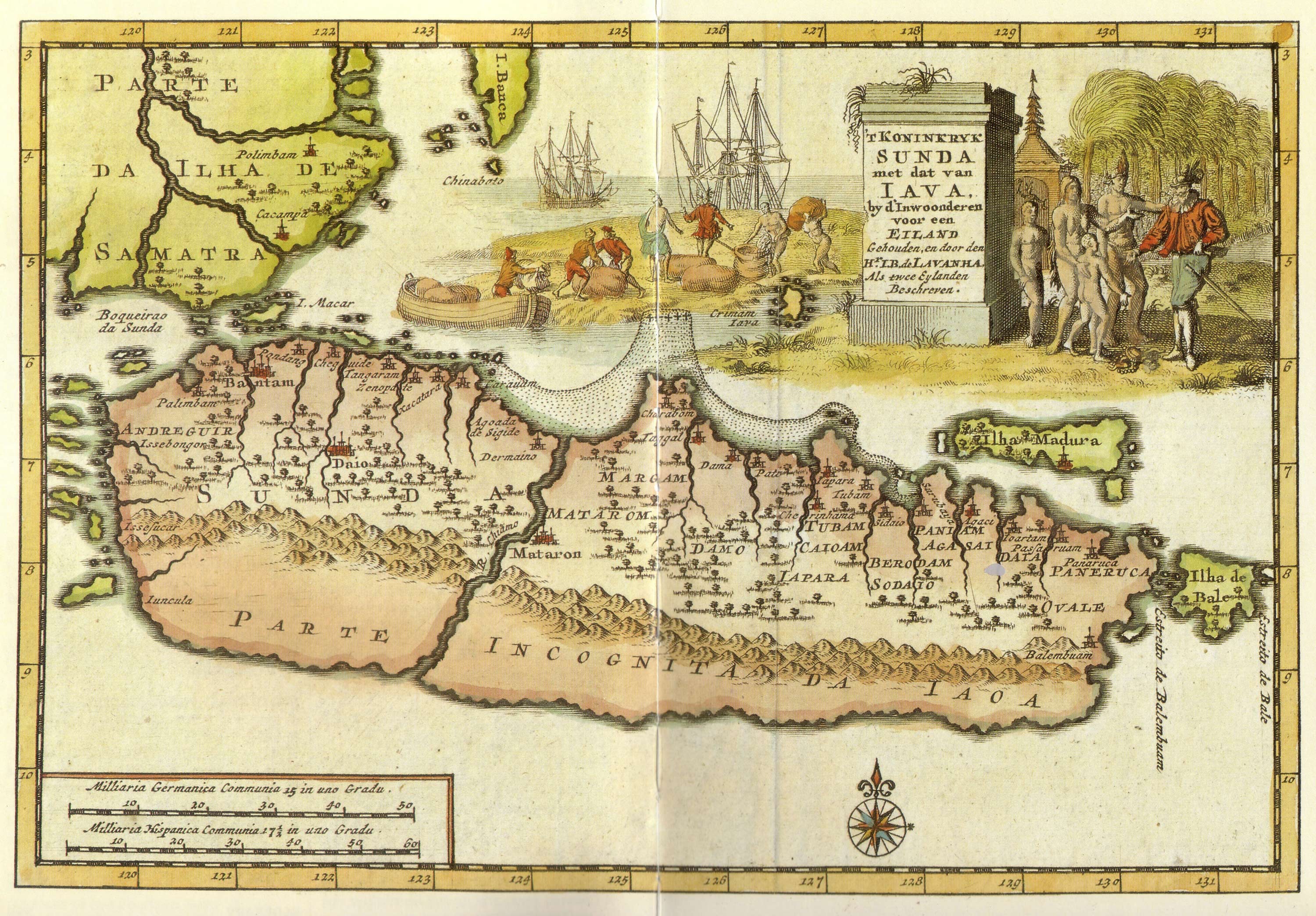Dutch East India Company in Indonesia
A 1596 Dutch expedition lost half its crew, killed a Javanese prince and lost a ship but returned to Holland with a load of spices, the profit from which encouraged other expeditions.
 Recognising the potential of the East Indies spice trade, and to prevent competition eating into Dutch profits, the Dutch Government amalgamated the competing merchant companies into the United East India Company. In 1602, the States-General of the Netherlands granted it a 21-year monopoly in the spice trade in Asia. It was awarded quasi-governmental powers, including the ability to wage war, imprison and execute convicts, negotiate treaties, coin money, and establish colonies.
Recognising the potential of the East Indies spice trade, and to prevent competition eating into Dutch profits, the Dutch Government amalgamated the competing merchant companies into the United East India Company. In 1602, the States-General of the Netherlands granted it a 21-year monopoly in the spice trade in Asia. It was awarded quasi-governmental powers, including the ability to wage war, imprison and execute convicts, negotiate treaties, coin money, and establish colonies. In 1603, the 1st permanent Dutch trading post in Indonesia was established in Banten, northwest Java and in 1611, another was established at Jayakarta.
In 1603, the 1st permanent Dutch trading post in Indonesia was established in Banten, northwest Java and in 1611, another was established at Jayakarta.VOC headquarters were in Ambon from 1610 to 1619, and although it was located centrally in the spice production areas, it was far from the Asian trade routes and other VOC activity ranging from Africa to Japan. A location in the west of the archipelago was thus sought; while the Straits of Malacca were strategic, the Portuguese conquest had made them dangerous, and the 1st permanent VOC settlement in Banten was difficult due to control by a powerful local ruler and competition from Chinese and English traders.
In 1604, a 2nd British East India Company voyage to Maluku, and subsequent establishments of trading posts between 1611 and 1617 across the archipelago began Anglo-Dutch competition for access to spices as the Dutch monopolistic ambitions were threatened. Diplomatic agreements and cooperation between the Dutch and the English over the spice trade ended with the Amboyna massacre where ten Englishmen were tortured and killed for conspiracy against the Dutch government, following which the English withdrew from their Indonesian activities.
In 1619, Jan Pieterszoon Coen was appointed Governor-General of the VOC. On 30 May 1619, Coen, backed by a force of nineteen ships, stormed Jayakarta driving out the Banten forces, and from the ashes, established Batavia as the VOC headquarters. Coen's plans had included making Batavia the centre of intra-Asian trade from Japan to Persia and to Burmese, Madagascan and Chinese labour to develop the spice trade. Although this plan was never realised, Coen managed to establish a Dutch monopoly of the spice trade through an alliance with the Sultan of Ternate in 1607 to control the production of cloves, and the occupation of the Banda Islands gave control of the nutmeg trade. The Dutch captured Melaka from the Portuguese in 1641 giving them control of the region's seas.
By the mid-seventeenth century Batavia had become an important trade center. It had repelled attacks from the Javanese Mataram kingdom. The Dutch defeated the Sulawesi city of Makassar in 1667 thus bringing its trade under VOC control. Sumatran ports were also brought under VOC control and the last of the Portuguese were expelled in 1660. In return for monopoly control over the pepper trade and the expulsion of the British, the Dutch helped the son of the ruler of Banten overthrow his father in 1680.
VOC policy at this time was to concentrate on its trading posts and to not become involved in costly territorial conquest. However, the company became deeply involved in the internal politics of Java in this period, and fought in a number of wars involving the leaders of Mataram and Banten. The VOC reached an accord with the susuhunan (king) of Mataram, Java's dominant kingdom, that only allowed Dutch ships to trade within the archipelago.
Although they failed to gain complete control of the Indonesian spice trade, they had much more success than the previous Portuguese efforts. They exploited the factionalisation of the small kingdoms in Java that had replaced Majapahit, establishing a permanent foothold in Java, from which grew a land-based colonial empire which became one of the world's richest colonial possessions.
VOC personnel lived separate to indigenous Indonesians, and Dutch people ranked low in indigenous status systems. As such, while the VOC introduced objects, techniques, corporate organisation into Indonesian society, its impact on Indonesian thinkers was minimal. Rather, at a time when Europe was denouncing autocratic rule, hierarchy and hereditary rights, the VOC borrowed these values from Indonesian societies. Governors-general acted like royalty and didn't leave the enclaves they had established, and like Indonesian royalty, they employed the local nobility and Chinese agents to organise labour.
Related Sites for Dutch East India Company in Indonesia
- About.com Asian History - Dutch East India Company read Dutch East India Company in Indonesia
- Dutch East India Company - New World Encyclopedia read Dutch East India Company in Indonesia
- Epic World History: Dutch East India Company (Indonesia/Batavia) read Dutch East India Company in Indonesia
- The Dutch East India Company - About.com Geography read Dutch East India Company in Indonesia

No comments:
Post a Comment